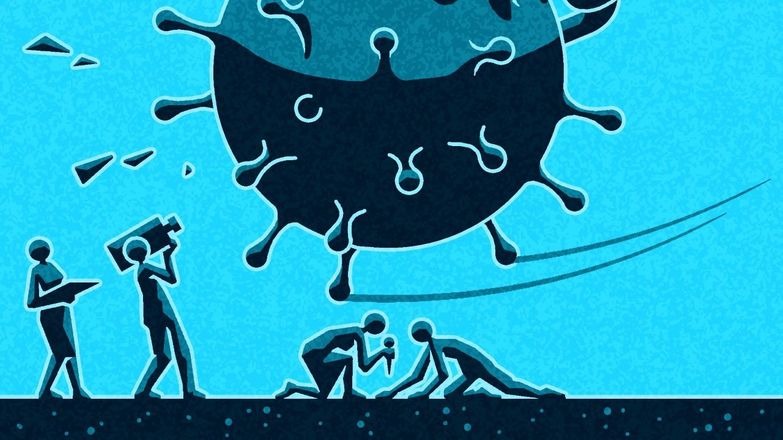DM2021 5PM Talk-In: NUJ’s News Recovery Plan
The week’s early evening debates started by discussing the union’s roadmap to protect public interest journalism.
We all accept that the arts cannot exist without state subsidy, Joyce McMillan, NUJ Edinburgh Freelance branch chair, told the NUJ's 5PM Talk-in, and now we need a paradigm shift to accept government funding is equally needed for public service journalism.
Joyce and her branch have been at the forefront of taking the NUJ's News Recovery Plan, to national and local politicians. The plan was launched a year ago in response to the crisis in the industry caused by the pandemic and is also a roadmap to reset a media with public interest journalism at its heart. It was lobbying by her Edinburgh-based colleagues that led to the setting up of a Scottish government-led working party to review the future of the media.
Sitting alongside her on the Zoom event organised as part of Delegate Meeting Week, were: Michelle Stanistreet, NUJ general secretary; Siobhan Holliman, joint chair, Irish Executive Council and member of the Irish government's Future of Media Commission; Nick Powell, chair of the NUJ's Welsh Executive Council; and Andy Grimm, reporter at the Chicago Sun-Times, president of the Chicago News Guild, who is working for The NewsGuild, the largest union for journalists in North America.
All the panel members – speaking via Zoom from all parts of the UK, Ireland and the United States of America – told a familiar story. Long-term lack of investment in journalism coupled with migration of advertising revenue to the tech giants had led to a weakened media, hollowed out by owners not interested in funding quality journalism.
When the pandemic arrived – the industry failed the stress test.
Michelle Stanistreet painted the picture. Journalists were put on furlough, the NUJ found itself dealing with thousands of job cuts at newspapers and broadcasters. The union staved off some of the job cuts and attempts to reduce pay, but many freelances found their work dried up overnight and then did not receive a penny from the UK government's Covid-19 aid packages. The shows, sports and events they usually covered all disappeared.
Siobhan Holliman said, nevertheless, NUJ members were still out there, producing the trusted, ethical news everyone was hungry for.
"We do a good job," she said. "and we want to continue to do it. But we are doing it with less and for less."
She said the Future of Media Commission was discussing a huge range of issues: from the role of journalism and democracy; the rise of misinformation and false news; diversity, equality and inclusivity; and how Irish culture, sport and talent is represented.
The Irish version of the News Recovery Plan is informing the commission's deliberations and discussions with Catherine Martin, minister for tourism, culture, arts, Gaeltacht, sport and media.
Likewise in Wales, Nick Powell, chair of the Welsh Executive Council, has taken the measures set out in the Recovery Plan to the Welsh government. He said before the pandemic, a government with a budget of £16 billion, a struggling NHS and failing floods agency all went unnoticed by the UK's national broadcasters, newspapers and websites, most of which are consumed by nearly everyone in Wales. This became a serious matter during the pandemic with the devolved governments responsible for Covid-19 planning, especially with a Welsh media where many newspaper journalists were on furlough or sacked, plus BBC Wales's decision to make 60 people redundant.
An equally bleak situation was outlined by Andy Grimm, of the NewsGuild.
"Since 2004, 2,100 newspapers have closed or merged and some 36,000 newspaper journalists have lost their jobs – totals that don't include roughly 60 newspapers that folded just in the last year plus an estimated 11,000 media jobs that evaporated in the first half of 2020 amid the Covid-19 pandemic," he said.
The ailing press has however been popular with private equity investors vultures which calculated that while newspapers were doomed, there was plenty of money to be made on the way down. Media News Group, controlled by private equity group Alden Global Capital, cut staff by an average of 75 per cent at its newspapers over a period of six two eight years, with some papers losing 90 per cent or more of their journalists.
Andy said the American government spent a pittance on public media, roughly $1.50 per capita in federal funds. This compares with the UK, which spends $100 per capita on public media, and Norway, with more than $150. The difference in America was the role of the "philanthropist", with billionaires such as Amazon's Jeff Bezos buying the Washington Post and John Henry, founder of investment management firm, John W. Henry & Company, who turned around the fortunes of the Boston Globe adding newspapers to their trophy football teams and yachts.
The panel agreed the pandemic had proved how important a trusted press was in its role of informing the public of the risk of the virus, while the internet buzzed with crazy conspiracy theories and dangerous quack cures. As a result, Joyce McMillan believes the Scottish government's working party could be moving towards recommending some sort of forum to champion public interest journalism.
The panellists agreed a mixture of funding sources and funding models – for example not-for-profit – plus tax incentives are needed to support public interest journalism. The BBC-financed Local Democracy Reporters scheme could be a model for providing public funding supporting for this sort of content, regardless of platform. They also concluded that the major media players would be chary of accepting public funding with strings attached.
Andy Grimm agreed with a major tenant of the NUJ's News Recovery Plan, that the time had come for the tech giants, which have been helping themselves to journalists' copy for free, to pay an annual levy with the proviso that the cash goes to news organisations which will spend it on improved news coverage, primarily by hiring more journalists.

From Health Crisis to Good News
A recovery plan for the news industry by the NUJ.

From Health Crisis to Good News: A recovery plan for the news industry in Ireland
NUJ proposals for a news recovery plan in Ireland.
